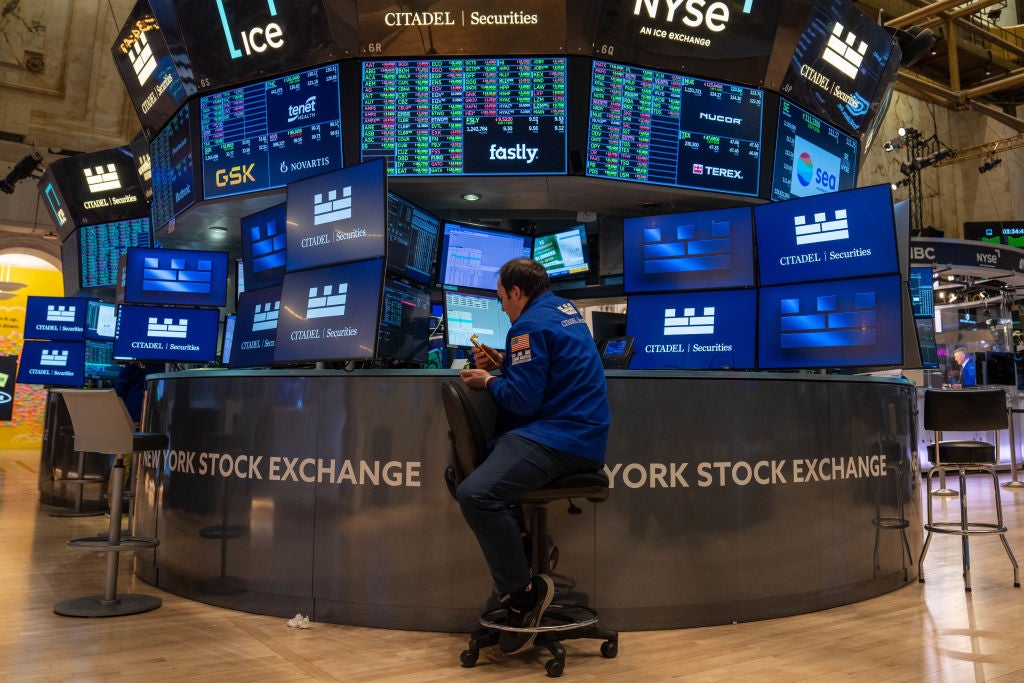The London Stock Exchange has opened sharply, down one per cent as a whole by 9:30am BST, in the wake of Donald Trump applying a ten per cent tariff to imported goods from the UK.
That includes a small amount of ground recovered following an even steeper opening, while around Europe there are even bigger drops in evidence, with Germany’s DAX down 1.3 per cent and France’s CAC 40 down almost 1.7 per cent.
The hardest hit sectors in the FTSE 100 include banks and investment trusts, with Standard Chartered suffering the biggest drop in share price of 7.5 per cent in early morning trading. HSBC (5.0 per cent), Barclays (4.4 per cent) and Lloyds (1.96 per cent) also suffered hits in the finance sector.
Those falls suffered by investment trusts are partly related to their own holdings of overseas stocks, in particular those Stateside. Earlier, stock prices fell sharply overnight in the US following Donald Trump’s announcement of global tariffs.
A blanket 10 per cent starting point and significant increases on certain countries means imports into the US will be more costly with almost instant effect, impacting manufacturers and consumers alike.
As a result of the tariff announcement, analysts at Barclays are foreseeing a “high risk” of a recession in the US this year, as well as increased inflation up to or beyond four per cent and higher than expected unemployment levels.
In the more immediate term, investors reacted by sending share prices significantly lower, with the futures markets showing entire indices pointing lower and individual companies even harder hit in many notable cases.
The S&P 500 and the Nasdaq are both more than three per cent down in after-hours trading, while smaller companies seem even harder hit, the Russell 2000 down 4.38 per cent around 7:30 am UK time. That’s after Japan’s Nikkei 225 ended the day more than three per cent lower in overnight trading, hitting an eight-month low following a strong run over the previous couple of years.
After each ended between flat and two per cent up in trading on Wednesday, the futures market show the so-called Magnificent Seven – Alphabet, Microsoft, Amazon, Nvidia, Apple, Tesla and Meta – highlighting the dramatic drops and negative market reaction to Trump’s latest and biggest bout of tariffs.
Microsoft is faring best among that notable giant group and is down 2.92 per cent in pre-trading, while most of the others are in the five-to-six per cent bracket down. Apple, however, is hardest hit initially – with a 7.14 per cent decline equivalent to around $240 billion (£183bn) being wiped off its market capitalisation value overnight.
Lindsay James, investment strategist at Quilter, pointed out that the president deliberately waited until after the closure of the stock market Stateside to announce his tariffs.

“Trump has made it clear that this is the end of the established economic order, and he wants America calling the shots. These tariffs are stark and perhaps more aggressive than many in the market had been expecting. Indeed, Trump scheduled this press conference for after the stock market closes for good reason, with the US futures market falling sharply as a result of this speech,” Ms James said.
“Ultimately, Trump is playing a high risk game. He is risking stoking a fresh inflationary spiral in the hope that over time jobs and industry are restored to the US. This is following an election campaign where he promised to lower inflation and bring interest rates down. But, tariffs have rarely ended in positive outcomes, and signs are already pointing to weakening consumer and business sentiment and the risk of a slowing US economy.
“Trump continues to tout tax cuts, but there remains very little detail on what this means or when they will come about.”
Additionally, Ms Quilter reinforced the likelihood of further ups and downs in the stock market across the coming weeks, with the possibility of Donald Trump changing his mind one factor to go along with the potential for retaliation.
“Markets will be wanting more detail on both this and further deregulation, and given the scale of these tariffs that may need to come sooner rather than later for US equities. For businesses it remains a very volatile and uncertain economic period, and this will be reflected by markets for the time being. Investors will need be patient and calm, staying invested for the long-term,” she said.
At Barclays, meanwhile, the risk for recession Stateside is heightened – but also higher inflation is likely, along with further job losses.
“We estimate that higher tariffs will boost price and exert a drag on activity. This is because tariffs raise the price of final and intermediate imported products, adversely affecting domestic consumers; raise the cost of investment in equipment and infrastructure; generally result in retaliation from other countries, which hurts exporters; and are associated with trade policy uncertainty, which causes businesses to delay capex investment and hiring. In the face of weaker growth in activity and employment, the unemployment rate tends to increase,” read a report by analysts including Marc Giannoni.








